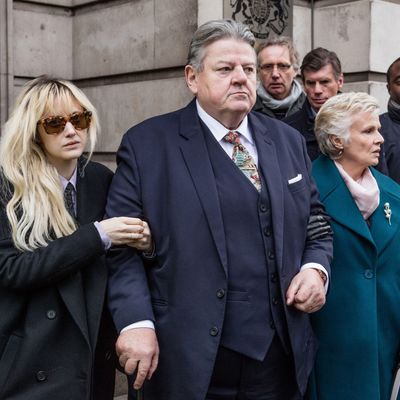
Self-preservation and the fog of memory are powerful forces in National Treasure, the British crime drama that starts streaming today on Hulu. With only four episodes that run just under an hour each, itÔÇÖs a quick, engrossing watch and the kind of show whose premise will ensnare you into moving forward until you know how it ends.
The first episode opens as Paul Finchley (Robbie Coltrane), a well-known British TV actor, is presenting his comedy partner, Karl Jenkins (Tim McInnerny), with a lifetime achievement award. Paul, who walks with a cane and seems quietly sad that his other half is being recognized instead of him, initially comes across as a rudderless man in the twilight of life, until a detective shows up at his house to search the premises and take him in for questioning on charges that he raped a teenage girl many years earlier. As the case makes the British papers and more women come forward with sexual-assault allegations, National Treasure hinges on one central question ÔÇö is Paul innocent or guilty? ÔÇö as well as other, related ones. Will his wife Marie (Julie Walters) continue to support him? Does Dee (Andrea Riseborough), the FinchleyÔÇÖs grown-up, recovering addict daughter, have some suppressed secrets of her own regarding her father? If this case goes to trial ÔÇö spoiler alert: it does ÔÇö will a jury convict a celebrity once so beloved?
As scripted by Jack Thorne, who also wrote the stage play Harry Potter and the Cursed Child, National Treasure is inspired by Operation Yewtree, an investigation into allegations of sexual abuse committed by numerous prominent British entertainers, most notably BBC TV personality Jimmy Savile, who was posthumously revealed to be a chronic predator and pedophile who raped or abused hundreds of children and women. Some of those accused in Yewtree were arrested and convicted; others were not. Audiences across the pond who watched National Treasure last fall, when it first aired on British television, likely had all of this context in their heads, which enhances the sense of suspense. Finchley could be terribly guilty or, as he contends, the victim of a witch hunt who, while a philanderer, would never force himself on a woman or young girl. We wonÔÇÖt, and donÔÇÖt, know for certain until we get to the final episode.
For American audiences, the case that National Treasure is more likely to conjure is the one against Bill Cosby. While the details are different and Cosby, currently facing a sexual-assault trial in June, has not yet been convicted of any crimes, the issues this series raises ÔÇö about how the alleged victims in such cases are characterized and the ways in which the famous men and those close to them attempt to defend and justify the allegations ÔÇö have a lot in common with the Cosby case.
As directed by Marc Munden, the tone in National Treasure is quietly ominous. Even in innocuous moments, it feels like something is off-kilter even if you canÔÇÖt say why. Natural light only occasionally enters the rooms the characters occupy, giving the impression theyÔÇÖre all wandering, confused, through the murk. A repeated element of the score features the faint ringing of a church bell, which makes you wonder for whom, exactly, itÔÇÖs tolling.
The performances from all of its fine British actors are deliberately subdued, so that when emotion does leak out ÔÇö as it does for all of them and, especially, for Paul in the final episode ÔÇö it makes an impact. Coltrane, best known to American audiences as Hagrid in the Harry Potter films, leans into his gentle giantness; you want to believe him when he says he could never do what heÔÇÖs been accused of doing. At the same time, his mood is never much better than melancholy. For a guy who made his reputation as a comedian, he is far from funny, though one can see, when he speaks before an audience at an awards show or offers a toast at a birthday party, he is quite capable of putting on a peppy public face when needed.
Both Riseborough and Walters have more than one face in this, too, and they reveal them in ways that elevate their roles beyond ÔÇ£wife worthy of pityÔÇØ and ÔÇ£messy, confused daughter.ÔÇØ
Some may find National Treasure a bit too dark or depressing; early on, I wondered whether it would raise more meaningful questions about these kinds of highly publicized rape and sexual-assault cases or just use them as a framework for an effective work of TV crime suspense.
But as it progresses and its narrative deepens, viewers are left with plenty of substantive matters to ponder, especially after its conclusion. The way National Treasure turns out may not qualify as a surprise or a twist. The fact that your gut tells you how itÔÇÖs all going to shake out, even as your intellect pulls you in multiple directions, is the whole point. That conflict between head and heart, which tugs at every single person in National Treasure, is what youÔÇÖll still be wrestling with well after the binge-watch is over.


